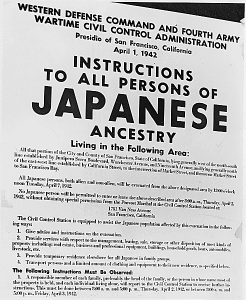 Are you willing to serve in the armed forces of the United States on combat duty, wherever ordered?
Are you willing to serve in the armed forces of the United States on combat duty, wherever ordered?
Will you swear unqualified allegiance to the United States of America and faithfully defend the United States from any and all attack by foreign or domestic forces?
These are two of the mandatory questions asked of Japanese Americans imprisoned at incarceration camps during World War II. Those young men who answered no to both questions were referred to as “no-no boys” and were often sent to prison on charges of disloyalty.
A play about the ordeals these men faced showed May 14 in New York City’s Studio Theatre. Adapted by Ken Narasaki from John Okada’s 1957 novel of the same name, “No-No Boy” follows the story of Ichiro, a young Japanese American who returns home to Seattle after his stint in prison for being a no-no boy.
Gerald Yamada, president of the Japanese American Veterans Association, writes in Rafu Shimpo that “No-No Boy” is enlightening because it sheds light onto why some Japanese Americans might have refused to serve in the U.S. military.
Other characters in the play include Ichiro’s mother, who refuses to believe Japan has lost the war, and members within the community who accuse Ichiro of disloyalty.
According to Yamada, the play focuses on themes of honesty and self-reflection as Ichiro navigates the aftermath of Japanese American internment during World War II.
“No-No Boy” first premiered in 2010 in Santa Monica, Calif. and is produced by the New York City-based Pan Asian Repertory Theatre.
You can read more about the play and Yamada’s opinions at Rafu Shimpo.
